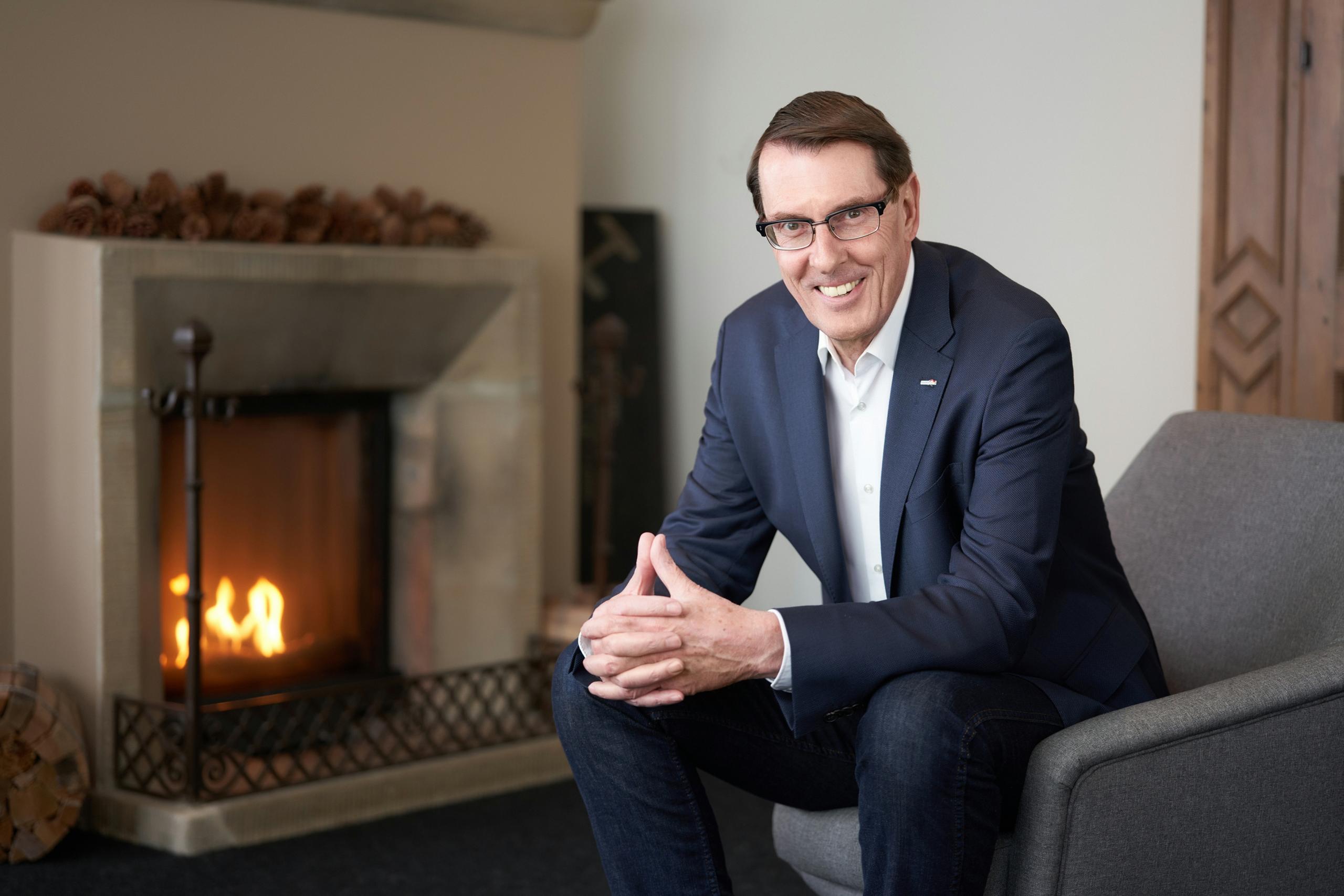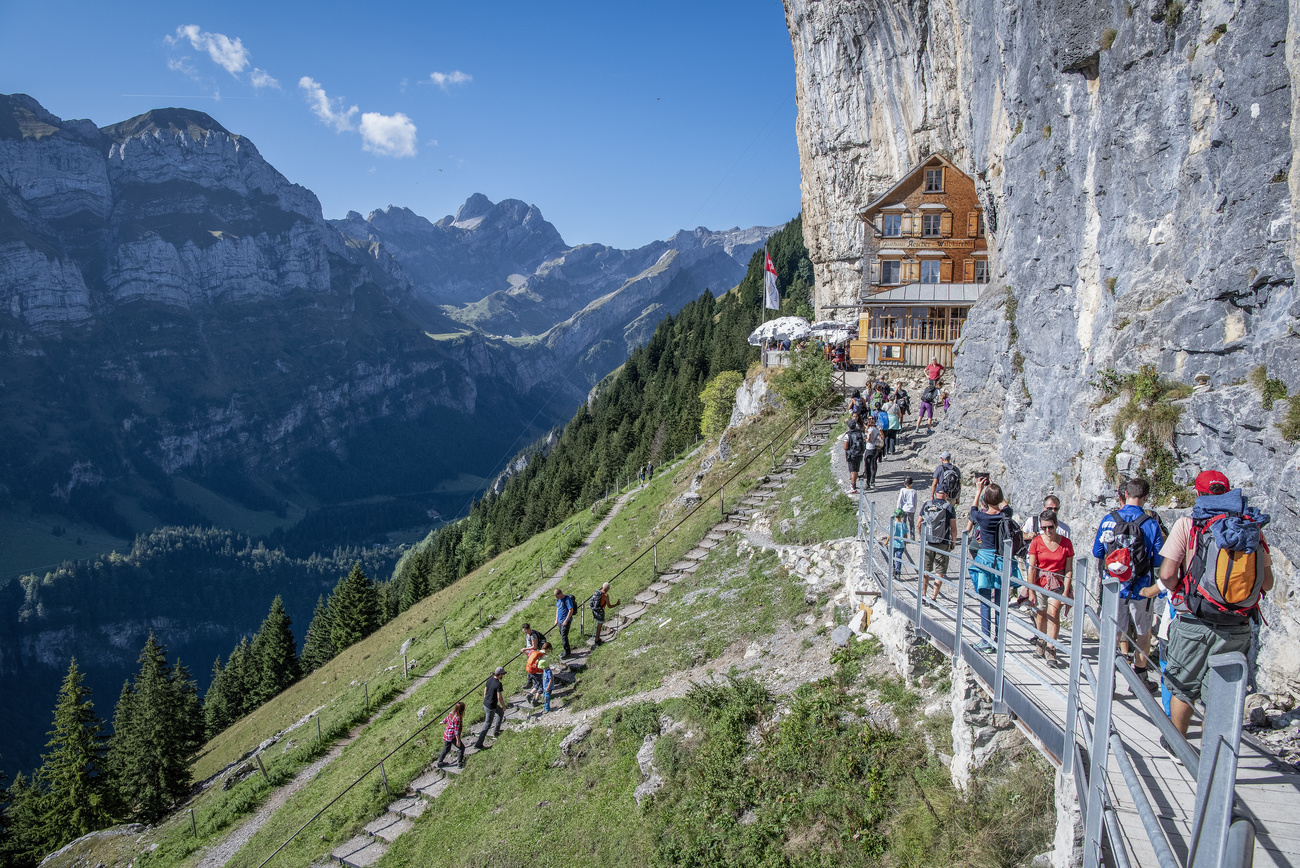
‘The Swiss hotel industry has survived crises and become resilient’

Andreas Züllig, president of the umbrella organisation HotellerieSuisse, is very optimistic about the sector’s future. He is in favour of foreign investors purchasing crown jewels of the Swiss hotel industry. But he also points to risks posed by high costs, the shortage of qualified labour and overtourism.
After the difficult years of the Covid-19 pandemic, the Swiss hotel industry has fully recovered. As the backbone of the tourism branch, the sector employs 75,000 people and generates a yearly profit of about CHF8.5 billion ($9.4 billion). With over 38 million overnight stays (only 3.8% less than the record year of 2019), 2022 was already a year of revival. This year all signs point to a new record of overnight stays being set.
Andreas Züllig has fostered a passion for the hotel industry since he was a child, having grown up in the hotel run by his parents. He qualified as a chef and exercised this profession. He later enrolled in the EHL Hospitality Business School in Lausanne. Together with his wife, he is now “host”, owner and director of the Schweizerhof Hotel in Lenzerheide (Graubünden). Züllig has been President of HotellerieSuisse since 2014. He is also involved in the governing bodies of different organisations both at the cantonal and national level, including the business federation economiesuisse.
In this favourable context, SWI swissinfo.ch sat down with Andreas Züllig, president of HotellerieSuisse, the umbrella organisation for the industry, at the Schweizerhof Hotel in Lenzerheide, canton Graubünden. Züllig is the host and director-general of the facility.
SWI swissinfo.ch: When you stay in a hotel, as an expert what catches your eye?
Andreas Züllig: The overall impression and atmosphere – the harmony between materials, colours and scents, but first and foremost, the attitude of the staff and their pleasure in welcoming the guests.
SWI: When it comes to tourism, Graubünden is probably performing the best nationwide. How do you explain this?
A.Z.: In our canton, tourism is really important, as it generates half of our export earnings. One important factor is that we act as an interface between northern and southern Europe. Also, our canton benefited from pioneers, such as in the accommodation sector and the mountain railways.
SWI:What are the big challenges facing the Swiss hotel industry?
A.Z.: High costs and a lack of skilled labour are our main challenges. Fortunately, thanks to a change in the law, issues related to the hotel reservation platform Booking.com have been resolved. Previously, the contract terms with Booking.com didn’t allow hotels to offer better prices.
SWI: In Switzerland, around 55% of all hotel guests come from abroad. From which countries do you still see a strong potential for growth?
A.Z.: The countries of origin vary depending on the [destination]. For example, the Titlis attracts a lot of Indian guests, whereas the Chinese really like the Jungfrau. That said, I’ve noticed that Americans are more and more interested in Switzerland. I welcome this development given the cultural closeness between the United States and our country. The situation is more complex in the case of the Asian, Arab or Indian tourists.
SWI: What are the possible problems with tourists from a very different cultural background?
A.Z.: An excessive number of large groups of tourists from countries with a very different culture inevitably provokes tensions with the local population. Lucerne and Lauterbrunnen, for example, recently fell victim to this phenomenon. Luckily Switzerland does not receive cruise ships, which are synonymous with overtourism. It is much better to focus on quality rather than on quantity. Finally, a factor of stability is represented by the fact that almost half of our customers are nationals, who are not affected by shifts in the exchange rate.

More
Mass tourism: “We feel like employees in a theme park”
SWI: How do you see hospitality training in Switzerland?
A.Z.: Generally speaking, it is excellent. We have world-famous schools, such as the EHL Hospitality Business School in Lausanne. The dual-track education system [of studying and doing an apprenticeship] also works very well, especially in German-speaking Switzerland.
SWI: Who are the main competitors of the Swiss hotel industry?
A.Z.: They vary depending on the region and, even more so, on the season. For example, in the winter, the eastern part of Switzerland is in direct competition with Austria. In the summer, the challengers are mainly the southern regions of Europe. When it comes to city tourism, we compete with destinations like Paris and Vienna, to name a few.
SWI: A significant number of Swiss hotels, especially in the luxury category, have been bought by foreign companies, notably from Qatar and China. How do you see this development?
A.Z.: It is a source of great satisfaction to see that foreign investors recognise the potential of Swiss hotels. It’s also a positive development that these investors are taking on the renovation of real crown jewels of the pioneering age of Swiss tourism, such as the Schweizerhof Hotel in Bern and the Bürgenstock Hotel overlooking Lake Lucerne.
More
SWI: During important gatherings like the Geneva International Motor Show or the annual meeting of the World Economic Forum in Davos, the high hotel prices are cause for concern.
A.Z.: We take these situations seriously. But if you have strong demand, it’s absolutely normal for prices to be high. This phenomenon is universal and can be seen everywhere in the world. With regard to Davos, the WEF checks the prices of nearly all the hotels. It is true that the prices are high, but they’re reasonable. It is the few hotels and apartments that are not monitored by the WEF that sometimes charge exorbitant prices. Unfortunately, the media focuses on these exceptional cases.
SWI: Less than half of the 4,500 Swiss hotels have introduced your classification based on the number of stars. Is this system reliable?
A.Z.: Our system is very reliable. Plus we have a good level of harmonisation with our European counterparts. More precisely, our classification applies to 80% of overnight stays and all the big hotels have adopted it.

More
Appenzell proposes to limit mass tourism
SWI: For HotellerieSuisse, how important is it to have strong political connections?
A.Z.: They are essential, especially with the Federal Council and the House of Representatives.
SWI: Are you satisfied with the framework conditions in Switzerland?
A.Z.: For our sector, the framework conditions remain very good, especially compared with other European countries. Our labour market is liberal, regulation constraints are limited and the collaboration with the social partners is good. The social contributions and taxes are also not too high. It is of great importance to really take care of these good framework conditions. Our association is dedicated to that.
SWI: Finally, how do you see the future of the Swiss hotel industry?
A.Z.: I’m extremely optimistic. We have set new records in the last few months. Plus, our industry has survived many crises and become very resilient.
Edited by Samuel Jaberg. Translated from French by Johannes Waardenburg/gw.

More
Fans of Netflix series disrupt peaceful Swiss village

In compliance with the JTI standards
More: SWI swissinfo.ch certified by the Journalism Trust Initiative
































You can find an overview of ongoing debates with our journalists here . Please join us!
If you want to start a conversation about a topic raised in this article or want to report factual errors, email us at english@swissinfo.ch.